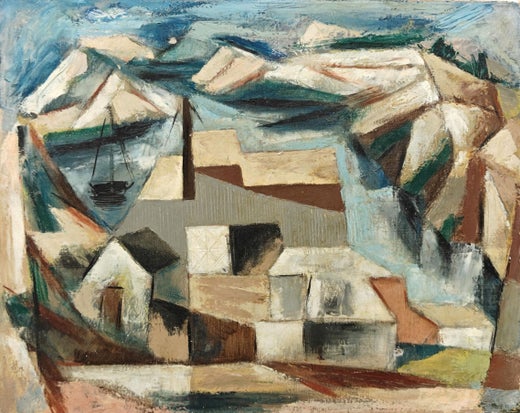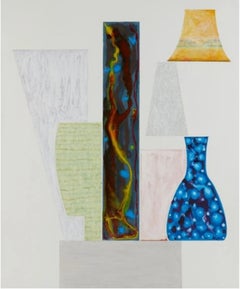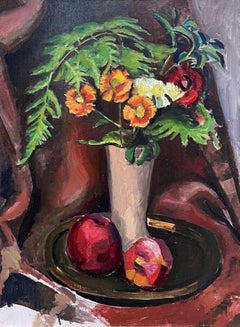Want more images or videos?
Request additional images or videos from the seller
1 of 8
Albert Heckman"Untitled" Albert Heckman, Floral Modernist Saturated Abstracted Still Lifecirca 1950
circa 1950
$8,000List Price
About the Item
- Creator:Albert Heckman (1893-1971, American)
- Creation Year:circa 1950
- Dimensions:Height: 33.5 in (85.09 cm)Width: 40.5 in (102.87 cm)
- More Editions & Sizes:Unique WorkPrice: $8,000
- Medium:
- Movement & Style:
- Period:
- Condition:
- Gallery Location:New York, NY
- Reference Number:1stDibs: LU1841215216112
Albert Heckman
Born in Meadville, Pennsylvania, Heckman came to NYC in 1915 and divided his time between there and Woodstock for the rest of his life except for 1929, when he studied in Leipzig. Married to concert violinist Florence Hardeman. Position: teacher, Hunter College, 1930-58; Teachers College Summer School, Woodstock, 1930s. Author: Paintings of Many Lands and Ages. He was a member of the Woodstock Art Association; and was also part of the Works Progress Administration Federal Arts Program in New York City, doing etching and block printing. He was influenced by Cubism and Expressionism.
About the Seller
5.0
Platinum Seller
Premium sellers with a 4.7+ rating and 24-hour response times
Established in 2022
1stDibs seller since 2022
122 sales on 1stDibs
Authenticity Guarantee
In the unlikely event there’s an issue with an item’s authenticity, contact us within 1 year for a full refund. DetailsMoney-Back Guarantee
If your item is not as described, is damaged in transit, or does not arrive, contact us within 7 days for a full refund. Details24-Hour Cancellation
You have a 24-hour grace period in which to reconsider your purchase, with no questions asked.Vetted Professional Sellers
Our world-class sellers must adhere to strict standards for service and quality, maintaining the integrity of our listings.Price-Match Guarantee
If you find that a seller listed the same item for a lower price elsewhere, we’ll match it.Trusted Global Delivery
Our best-in-class carrier network provides specialized shipping options worldwide, including custom delivery.You May Also Like
Original oil painting by prominent & searchable artist Steve McElroy.
By Steve McElroy
Located in Dallas, TX
This artist's butterfly work is in the current Veranda Magazine with Jan Showers.
"Sunflowers" oil on canvas original painting by Steve McElroy. 16 x 20...
Category
2010s Abstract Still-life Paintings
Materials
Canvas, Oil
$1,100
H 20 in W 16 in D 1.5 in
French 20th Century Vibrant Geometric Abstraction Yellow Green and Blue Lines
Located in Cirencester, Gloucestershire
Abstract Expressionist Composition
by Gilbert Pelissier (French born 1924)
oil painting on canvas, unframed
canvas size: 18 x 24 inches
condition: overall very good, a few minor su...
Category
Late 20th Century Abstract Expressionist Abstract Paintings
Materials
Canvas, Oil
French 20th Century Vibrant Geometric Abstraction Interwoven Lines and Balls
Located in Cirencester, Gloucestershire
Abstract Expressionist Composition
signed by Gilbert Pelissier (French born 1924)
oil painting on canvas, unframed
canvas size: 9.5 x 13 inches
condition: overall very good, a few m...
Category
Late 20th Century Abstract Expressionist Abstract Paintings
Materials
Canvas, Oil
French 20th Century Vibrant Abstraction Expressionist Signed Oil Painting
Located in Cirencester, Gloucestershire
Abstract Expressionist Composition
signed by Gilbert Pelissier (French born 1924)
oil painting on canvas, unframed
canvas size: 9 x 13 inches
condition: overall very good, a few min...
Category
Late 20th Century Abstract Expressionist Abstract Paintings
Materials
Canvas, Oil
French 20th Century Vibrant Abstract Expressionist Still Life Oil Painting
Located in Cirencester, Gloucestershire
Abstract Expressionist Composition
by Gilbert Pelissier (French born 1924)
oil painting on canvas, unframed
canvas size: 16.5 x 13 inches
condition: overall very good, a few minor s...
Category
Late 20th Century Abstract Expressionist Abstract Paintings
Materials
Canvas, Oil
$1,043
H 16.5 in W 13 in
French 20th Century Vibrant Geometric Abstraction Snapped Line Green and Blue
Located in Cirencester, Gloucestershire
Abstract Expressionist Composition
signed by Gilbert Pelissier (French born 1924)
oil painting on canvas, unframed
canvas size: 20 x 24 inches
condition: overall very good, a few m...
Category
Late 20th Century Abstract Expressionist Abstract Paintings
Materials
Canvas, Oil
Large French 1970's Geometric Abstract Painting Brown Beige Yellow Green Colors
Located in Cirencester, Gloucestershire
Artist/ School: French School, 1970's, inscribed verso
Title: Geometric abstract composition
Medium: signed oil painting on canvas, framed
framed: 30.5 x 39.5 inches
canvas: 29...
Category
20th Century Abstract Geometric Still-life Paintings
Materials
Canvas, Oil
$3,023
H 30.5 in W 39.5 in
20th Century Original French Expressionist Oil Painting Vibrant Red Flower
Located in Cirencester, Gloucestershire
Original oil painting by P. Valetti (French, second half 20th century)
oil on canvas, unframed
size: 18 x 14.75 inches
condition: very good
provenance: from the artists estate, Franc...
Category
20th Century Abstract Expressionist Still-life Paintings
Materials
Canvas, Oil
Three Daisies Abstracted Still-Life
By Daniel David Fuentes
Located in Soquel, CA
Whimsical abstracted textural still life with three daises and other objects floating through an ambiguous orange space by Daniel David Fuentes (American, 1978-2016). From a collecti...
Category
Early 2000s Abstract Expressionist Abstract Paintings
Materials
Oil, Cardboard, Canvas
$640 Sale Price
20% Off
H 16 in W 20 in D 0.13 in
"Red Line" (2024) By John McCaw, Original Abstract Oil Painting
By John McCaw
Located in Denver, CO
John McCaw's (US based) "Red Line" (2024) is an oil painting that depicts an abstract still life.
John McCaw (b. 1967), the eldest son of American expressionist Dan McCaw and brothe...
Category
2010s Abstract Abstract Paintings
Materials
Canvas, Oil, Board
$1,800
H 26.25 in W 20.25 in D 1.5 in
More From This Seller
View All"Abstract (with Two White Vases) " Ed Baynard, Still Life Composition
By Ed Baynard
Located in New York, NY
Ed Baynard
Abstract (with Two White Vases), 2005
Signed, titled, and dated along the verso
Acrylic on canvas
48 x 40 inches
Category
Early 2000s Abstract Abstract Paintings
Materials
Canvas, Acrylic
"Nature morte" Bela de Kristo, Mid-century Cubist Still Life Abstract Cello
By Bela De Kristo
Located in New York, NY
Bela de Kristo
Nature morte, circa 1956
Signed lower right
Oil on board
19 5/8 x 11 3/4 inches
Provenance:
Alexander Kahan Fine Arts, New York
Private ...
Category
1950s Cubist Still-life Paintings
Materials
Oil, Board
"Floral Still Life with Two Apples" Hayley Lever, Modernist Still Life Painting
By Hayley Lever
Located in New York, NY
Hayley Lever
Floral Still Life with Two Apples
Signed lower right
Oil on canvas
20 x 16 inches
Hayley Lever’s versatility has worked against his posthumous reputation. He was never...
Category
Early 20th Century Modern Still-life Paintings
Materials
Canvas, Oil
"Untitled" Albert Heckman, Modernist Saturated Blue and Yellow Still Life
By Albert Heckman
Located in New York, NY
Albert Heckman
Untitled, circa 1950
Signed lower right
Oil on canvas
18 x 24 inches
Albert Heckman was born in Meadville, Western Pennsylvania, 1893. He went to New York City to try his hand at the art world in 1915 after graduating from high school and landing a job at the Meadville Post Office. In 1917, at the age of 24, Heckman enrolled part-time in Teachers' College, Columbia University's Fine Arts Department to begin his formal art education. He worked as a freelance ceramic and textile designer and occasionally as a lecturer at the Metropolitan Museum of Art. In the early 1920s, at the age of almost 30, he graduated with a Bachelor of Arts degree from Columbia Teachers College. He was especially impacted by his instructor at Columbia, Arthur Wesley Dow.
After graduating, he was hired by the Teachers' College as a Fine Arts instructor. He stayed with Columbia Teachers' College until 1929, when he left to attend the Leipzig Institute of Graphic Arts in Leipzig, Germany. Isami Doi (1903-1965), who was born in Hawaii, was arguably his most impressive student at Columbia. Doi is now regarded as one of the most prominent artists hailing from Hawaii. Heckman became an active member and officer of the Keramic Society and Design Guild of New York in the 1920s as part of his early commercial art career. The Society's mission was to share knowledge and showcase textile and ceramic design exhibits.
In 1922, Heckman married Florence Hardman, a concert violinist. Mrs. Heckman's concert schedule during the 1920s kept Albert and Florence Heckman apart for a significant portion of the time, but they spent what little time they had together designing and building their Woodstock, New York, summer house and grounds. A small house and an acre of surrounding land on Overlook Mountain, just behind the village of Woodstock, were purchased by Albert and Florence Heckman at the time of their marriage. Their Woodstock home, with its connections, friendships, and memories, became a central part of their lives over the years, even though they had an apartment in New York City.
Heckman's main artistic focus shifted to the house on Overlook Mountain and the nearby towns and villages, Kingston, Eddyville, and Glasco. After returning from the Leipzig Institute of Graphic Arts in 1930, Mr. Heckman joined Hunter College as an assistant professor of art. He worked there for almost thirty years, retiring in 1956. Throughout his tenure at Hunter, Mr. Heckman and his spouse spent the summers at their Woodstock residence and the winters in New York City. They were regular and well-known guests at the opera and art galleries in New York. Following his retirement in 1956, the Heckmans settled in Woodstock permanently, with occasional trips to Florida or Europe during the fall and winter. Mr. Heckman's close friends and artistic career were always connected to Woodstock or New York City. He joined the Woodstock art group early on and was greatly influenced by artists like Paul and Caroline Rohland, Emil Ganso, Yasuo Kuniyoshi, Andre Ruellan, and her husband, Jack...
Category
1950s Modern Interior Paintings
Materials
Oil, Canvas
"Untitled" Albert Heckman, circa 1950 Modernist Colorful Still Life With Fruit
By Albert Heckman
Located in New York, NY
Albert Heckman
Untitled, circa 1950
Signed lower right
Oil on canvas
24 x 30 inches
Albert Heckman was born in Meadville, Western Pennsylvania, 1893. He went to New York City to try his hand at the art world in 1915 after graduating from high school and landing a job at the Meadville Post Office. In 1917, at the age of 24, Heckman enrolled part-time in Teachers' College, Columbia University's Fine Arts Department to begin his formal art education. He worked as a freelance ceramic and textile designer and occasionally as a lecturer at the Metropolitan Museum of Art. In the early 1920s, at the age of almost 30, he graduated with a Bachelor of Arts degree from Columbia Teachers College. He was especially impacted by his instructor at Columbia, Arthur Wesley Dow.
After graduating, he was hired by the Teachers' College as a Fine Arts instructor. He stayed with Columbia Teachers' College until 1929, when he left to attend the Leipzig Institute of Graphic Arts in Leipzig, Germany. Isami Doi (1903-1965), who was born in Hawaii, was arguably his most impressive student at Columbia. Doi is now regarded as one of the most prominent artists hailing from Hawaii. Heckman became an active member and officer of the Keramic Society and Design Guild of New York in the 1920s as part of his early commercial art career. The Society's mission was to share knowledge and showcase textile and ceramic design exhibits.
In 1922, Heckman married Florence Hardman, a concert violinist. Mrs. Heckman's concert schedule during the 1920s kept Albert and Florence Heckman apart for a significant portion of the time, but they spent what little time they had together designing and building their Woodstock, New York, summer house and grounds. A small house and an acre of surrounding land on Overlook Mountain, just behind the village of Woodstock, were purchased by Albert and Florence Heckman at the time of their marriage. Their Woodstock home, with its connections, friendships, and memories, became a central part of their lives over the years, even though they had an apartment in New York City.
Heckman's main artistic focus shifted to the house on Overlook Mountain and the nearby towns and villages, Kingston, Eddyville, and Glasco. After returning from the Leipzig Institute of Graphic Arts in 1930, Mr. Heckman joined Hunter College as an assistant professor of art. He worked there for almost thirty years, retiring in 1956. Throughout his tenure at Hunter, Mr. Heckman and his spouse spent the summers at their Woodstock residence and the winters in New York City. They were regular and well-known guests at the opera and art galleries in New York. Following his retirement in 1956, the Heckmans settled in Woodstock permanently, with occasional trips to Florida or Europe during the fall and winter. Mr. Heckman's close friends and artistic career were always connected to Woodstock or New York City. He joined the Woodstock art group early on and was greatly influenced by artists like Paul and Caroline Rohland, Emil Ganso, Yasuo Kuniyoshi, Andre Ruellan, and her husband, Jack...
Category
1950s Modern Interior Paintings
Materials
Canvas, Oil
"Cattleya Orchids" Jane Peterson, Modernist Bright Flowers, Female Impressionist
By Jane Peterson
Located in New York, NY
Jane Peterson
Cattleya Orchids, circa 1940s
Signed lower right
Oil on canvas
32 x 32 inches
Provenance
Estate of the artist
Artist’s estate sale, Ipswich, Massachusetts, 1960s
Priva...
Category
1930s American Modern Figurative Paintings
Materials
Canvas, Oil



